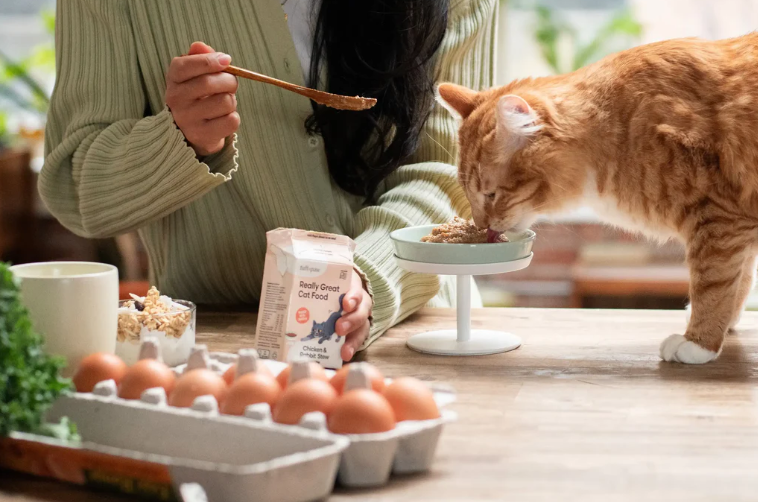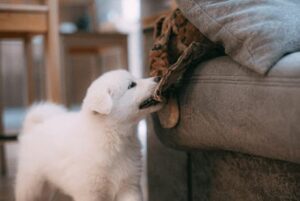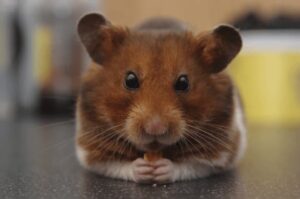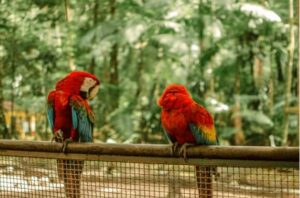Can Adult Cats Eat Kitten Food? Cats are beloved companions, and as responsible pet owners, we want to ensure they receive the best nutrition possible. But what happens if your adult cat sneaks a bite of kitten food? Or perhaps you’re considering feeding your adult cat kitten food for specific reasons?
This comprehensive guide explores whether adult cats can safely eat kitten food, the differences in nutritional content, potential benefits and risks, and expert recommendations to keep your feline friend healthy and happy.
Understanding the Nutritional Differences Between Kitten and Adult Cat Food
1. Why Is Kitten Food Different from Adult Cat Food?
Kitten food is specifically formulated to meet the needs of growing kittens. Compared to adult cat food, it contains:
- Higher protein content to support rapid growth and muscle development.
- More calories to fuel their energetic lifestyle.
- Essential nutrients like DHA for brain and vision development.
- Increased fat content to sustain high activity levels.
- Additional vitamins and minerals for bone and immune system health.
2. Nutritional Breakdown: Kitten vs. Adult Cat Food
| Nutrient | Kitten Food | Adult Cat Food |
|---|---|---|
| Protein | 35-50% | 25-40% |
| Fat | 20-30% | 10-20% |
| Calories per cup | 400-500 kcal | 300-400 kcal |
| DHA (Omega-3) | High | Moderate |
| Calcium & Phosphorus | Higher levels | Moderate levels |
Can Adult Cats Safely Eat Kitten Food?
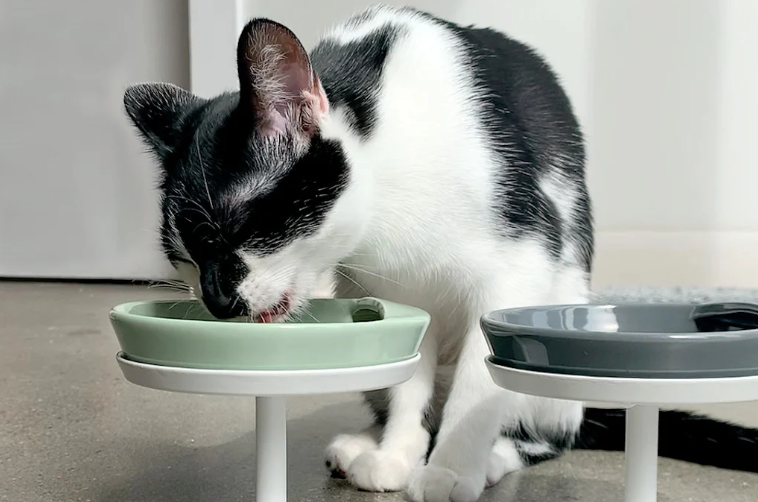
1. When It’s Safe for Adult Cats to Eat Kitten Food
In certain cases, feeding kitten food to an adult cat can be beneficial:
- Pregnant and nursing cats: They require extra calories and nutrients to support fetal development and milk production.
- Underweight or malnourished cats: High-calorie kitten food can help them regain weight and improve their health.
- Senior cats with weight loss issues: If an older cat struggles to maintain weight, kitten food can offer a nutritional boost.
- Cats recovering from illness or surgery: Extra protein and calories can aid in faster recovery.
2. When Kitten Food Is Not Ideal for Adult Cats
While an occasional meal of kitten food won’t harm an adult cat, long-term feeding can lead to health issues:
- Obesity: Excess calories and fat can cause rapid weight gain in sedentary adult cats.
- Nutritional imbalances: Kitten food has higher levels of certain nutrients that may not be necessary for adult cats.
- Digestive issues: Some adult cats may experience stomach upset or diarrhea due to the richer formulation.
3. Short-Term vs. Long-Term Feeding of Kitten Food
- Short-term (occasional feeding): Safe in small amounts, especially if your cat enjoys the taste.
- Long-term (regular feeding): Not recommended unless advised by a veterinarian.
Best Practices for Feeding Kitten Food to Adult Cats
If you need to feed your adult cat kitten food for a specific reason, follow these guidelines:
- Choose high-quality kitten food with real meat and essential nutrients.
- Monitor portion sizes to prevent overfeeding and weight gain.
- Gradually transition back to adult cat food when appropriate.
- Consult your veterinarian for personalized advice based on your cat’s health needs.
Frequently Asked Questions (FAQs)
1. What Happens If My Adult Cat Eats Kitten Food Occasionally?
Occasional consumption of kitten food is harmless, but regular feeding may lead to weight gain and digestive issues.
2. Can Kitten Food Help My Senior Cat Gain Weight?
Yes, under veterinary supervision, kitten food can be a useful tool for weight gain in senior cats experiencing weight loss.
3. Is Kitten Food Good for Cats with Health Issues?
It depends on the health condition. Kitten food can be beneficial for malnourished or recovering cats but may be unsuitable for cats with kidney disease or obesity.
4. Can I Mix Kitten Food with Adult Cat Food?
Mixing in small amounts can help transition a cat between diets, but it shouldn’t be a permanent solution unless necessary.
5. How Long Should a Cat Eat Kitten Food?
Kittens should eat kitten food until about 12 months old before transitioning to adult cat food.
Final Thoughts
Can adult cats safely eat kitten food? Yes, but only in specific circumstances. Kitten food is rich in nutrients, making it beneficial for certain adult cats, such as pregnant, underweight, or recovering felines. However, it is not suitable for long-term feeding in healthy adult cats due to the risk of obesity and nutritional imbalances. Always consult your veterinarian before making dietary changes.
By understanding the differences between kitten and adult cat food, you can make informed decisions that promote your cat’s long-term health and well-being.
Has your cat ever sneaked a bite of kitten food? Share your experience in the comments below!
